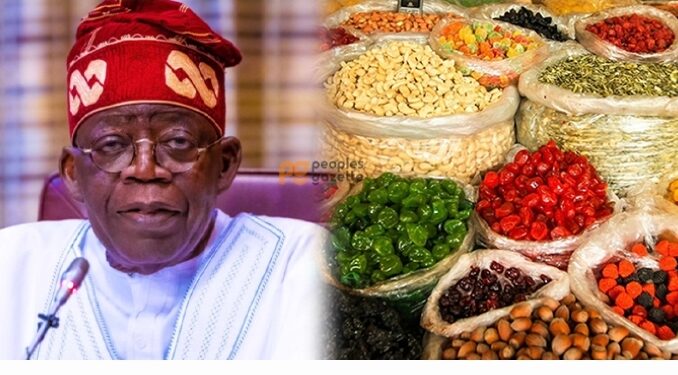
The President Bola Tinubu-led Nigerian government has blamed Nigeria’s persistently high food prices not on production shortages or official economic mismanagement, but on the activities of “middlemen and retail profiteers” who allegedly inflate costs between farms and urban markets.
Bayo Onanuga, the Special Adviser to President Tinubu on Information and Strategy, disclosed this in an interview with Daily Trust, where he shared personal anecdotes and government positions aimed at deflecting blame for the current hardship faced by millions of Nigerians.
According to Onanuga, one of the primary reasons Nigerians are struggling with food price inflation is the exploitative role of intermediaries who buy goods from farmers at low prices and resell them at exorbitant rates in cities.
“One reason for persistently high food prices is the role of middlemen. Many buy food from farmers at fair prices in rural areas, then bring it to urban centres and increase prices excessively,” he said.
Giving a personal example to support his claim, Onanuga recalled, “I was in Lagos recently and bought a crate of eggs. I didn’t even check the price until I was about to leave, and I was told it cost N10,000. I asked my driver if that could be right. He wasn’t sure, as he doesn’t usually buy egg crates. But when I returned to Abuja and purchased the same crate at the fruit market in Maitama, it cost N6,000.
“The Lagos supermarket ripped me off,” he fumed. “This sort of arbitrary price fixing by retailers is making life harder for ordinary Nigerians.”
He further blamed what he described as opportunistic pricing tied to foreign exchange rates.
“I have also seen cases where people say, ‘Oh, the dollar is now N1500,’ and immediately raise prices — even when the product has nothing to do with imported content. That kind of behaviour is a key driver of inflation.”
But while blaming local actors, the presidential adviser claimed the government is “making efforts to ease the burden where it matters most — food and medicine.”
He cited recent data from the National Bureau of Statistics (NBS), which he said showed a slight decline in food inflation in the past two months.
According to him, part of the Tinubu administration’s response includes importing agricultural machinery and allowing controlled food importation.
“The government imports agricultural machinery, including tractors and harvesters, to promote mechanised farming. We are moving away from the traditional hoe-and-cutlass approach,” he said.
“The goal is to encourage states and stakeholders in the agricultural sector to scale up mechanised farming — real industrial agriculture.”
He also defended the decision to import food items, claiming it helped in reducing prices. “Some critics said this would hurt local producers. But the reality is that when prices rise beyond what people can afford, the government cannot just fold its arms. That’s not price control — it’s intervention.”
Onanuga did not stop there. He pointed fingers at ordinary Nigerians as part of the problem, citing speculative hoarding of food items.
“I know of a driver who invested N5 million in beans hoping that prices would rise. He lost over N2million when prices crashed and couldn’t find buyers. That’s what speculation does,” he said.
He referenced a viral video of a traditional ruler in Ekiti confronting traders for marking up goods by over 300 per cent, calling it “profiteering and criminal.”
“Part of the problem lies with us, Nigerians — some of us began profiteering as soon as the reforms kicked in,” he said.
Shifting focus to the oil sector, he noted that fuel prices, which initially soared after subsidy removal, have now started to drop — citing recent figures and lauding Aliko Dangote for deploying 4,000 trucks to distribute petrol without transportation charges.
“Each time a new price is announced — say, N875 in Lagos and N895 in Abuja — you can see that the cost of transporting fuel from Lagos to Abuja is about N20 per litre. If you remove that cost, prices will drop.”
Leave a Reply